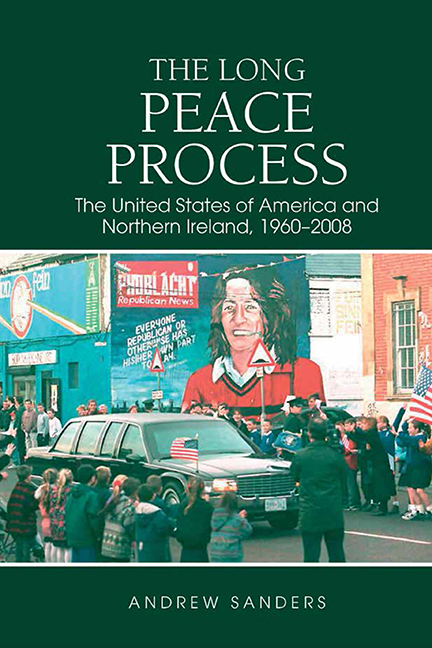Book contents
- Frontmatter
- Contents
- List of Abbreviations
- Acknowledgements
- Introduction
- 1 The USA and Ireland before 1968
- 2 The Early Years of the ‘Troubles’
- 3 Jimmy Carter and the Presidential Statement on Northern Ireland
- 4 Thatcher, Reagan, and Northern Ireland
- 5 The Bush Administration and Northern Ireland as a Local Political Issue
- 6 Bill Clinton and the Path to Good Friday
- 7 George W. Bush, Barack Obama, and Post-Conflict Northern Ireland
- Conclusion
- Select Bibliography
- Index
2 - The Early Years of the ‘Troubles’
- Frontmatter
- Contents
- List of Abbreviations
- Acknowledgements
- Introduction
- 1 The USA and Ireland before 1968
- 2 The Early Years of the ‘Troubles’
- 3 Jimmy Carter and the Presidential Statement on Northern Ireland
- 4 Thatcher, Reagan, and Northern Ireland
- 5 The Bush Administration and Northern Ireland as a Local Political Issue
- 6 Bill Clinton and the Path to Good Friday
- 7 George W. Bush, Barack Obama, and Post-Conflict Northern Ireland
- Conclusion
- Select Bibliography
- Index
Summary
We trust that both the British and Irish Governments are doing all they can to avoid a civil war.
Henry Kissinger to Gerald Ford, January 1975President Nixon appointed Henry Kissinger as his National Security Advisor in January 1969. Part of his remit in this role was to keep the President informed on events in Northern Ireland. Working alongside Kissinger were a number of senior officials who followed the developing conflict and offered insight as to how it might impact the United States and its relations with the UK and the Republic of Ireland. Kissinger was later appointed as Secretary of State by Nixon in 1973.
The eight years between the election of Richard Nixon and that of Jimmy Carter bore witness to the worst years of the Northern Ireland conflict. By the time of Carter's election on 2 November 1976, 1,831 people had been killed in Northern Ireland. Yet eight years previously only small signs of the trouble that lay ahead for Northern Ireland were evident. Three Ulster Volunteer Force murders in mid-1966 had been the only significant violence until the emergence of, and particularly the violent resistance that met, the Northern Ireland Civil Rights Association two years later. The situation escalated rapidly, however, to the extent that by the mid-point of Nixon's first term in office Northern Ireland sat on the brink of a bloody sectarian civil war.
Throughout Nixon's time in office, there were repeated attempts on the part of political figures both internationally, from the United Kingdom and the Republic of Ireland, and domestically, in the form of members of Congress, to engage his administration in the conflict. Nixon considered that any official intervention would be a violation of UK sovereignty and was determined that this would not happen, and the US position was consistently that a solution could only come through the engagement of all domestic parties. This did not stop figures such as Senator Edward Kennedy and Thomas P. ‘Tip’ O’Neill, Jr. from taking a keen interest in both the conflict and the US response to it. O’Neill began the Nixon Administration as a Representative and served as House Majority Whip and House Majority Leader before becoming the Speaker of the House in January 1977. Kennedy and O’Neill would lead Congressional efforts to engage the United States in the Northern Ireland conflict that endured far longer than either Nixon or Ford.
- Type
- Chapter
- Information
- The Long Peace ProcessThe United States of America and Northern Ireland, 1960-2008, pp. 29 - 90Publisher: Liverpool University PressPrint publication year: 2019



